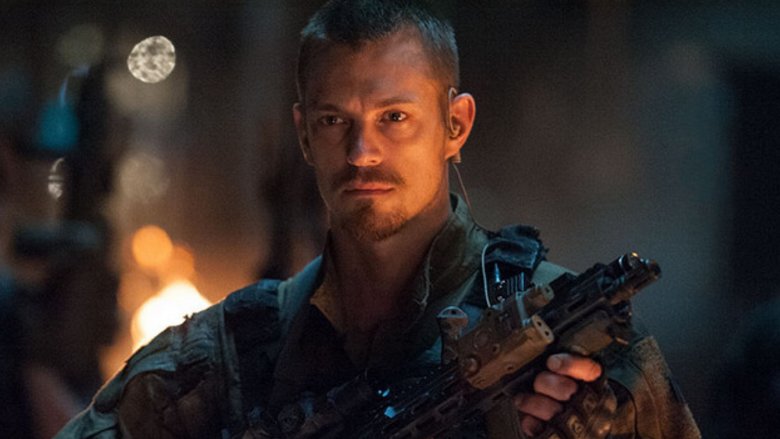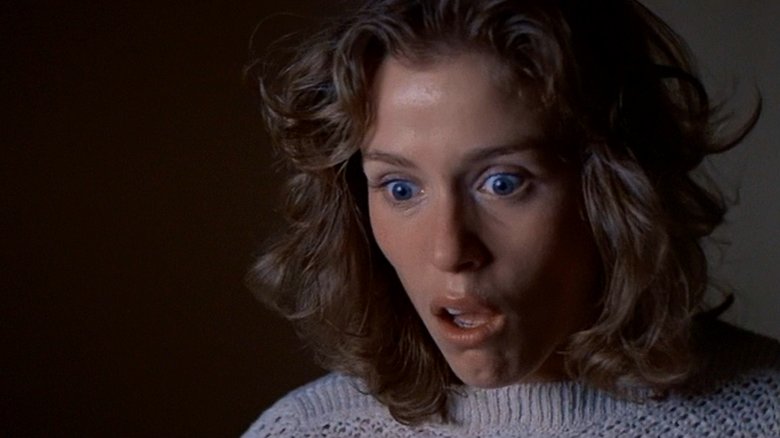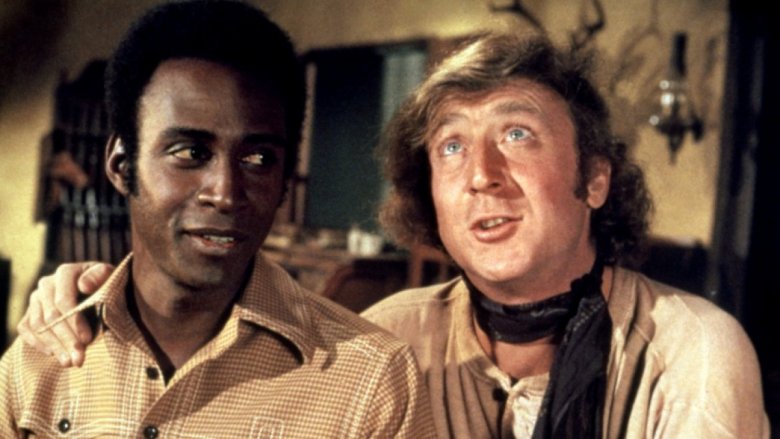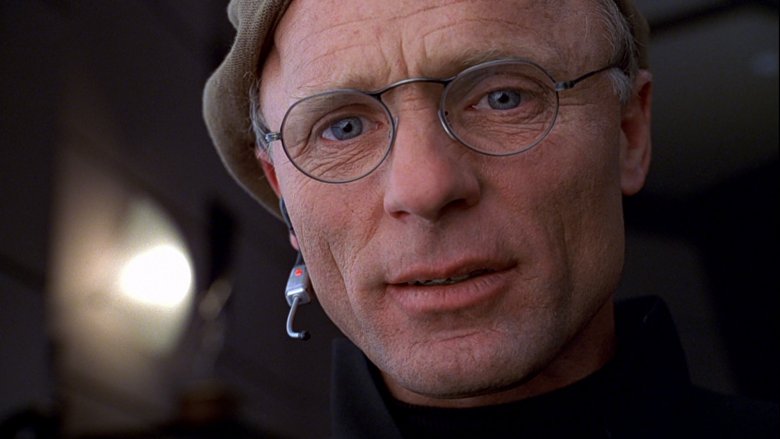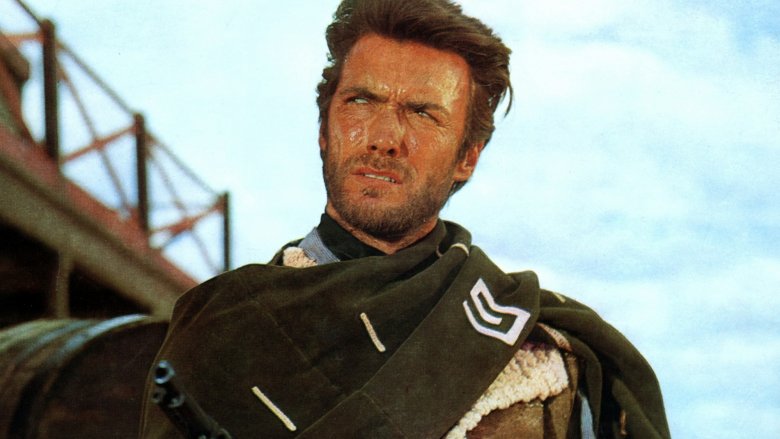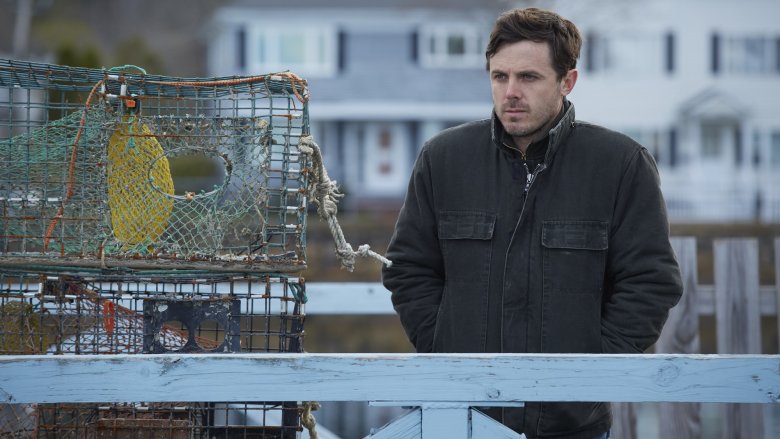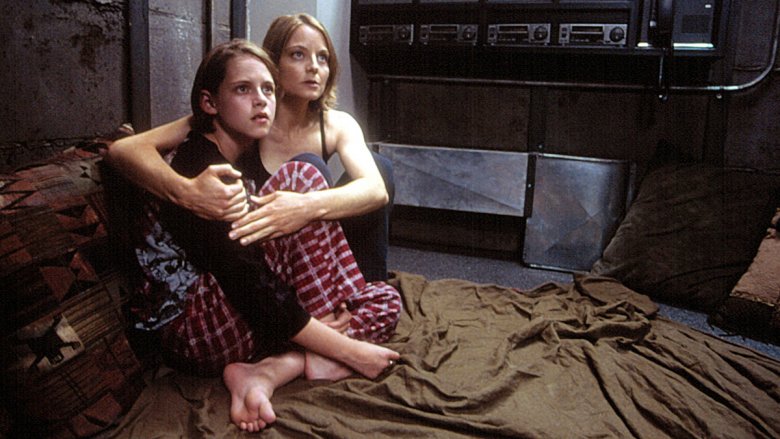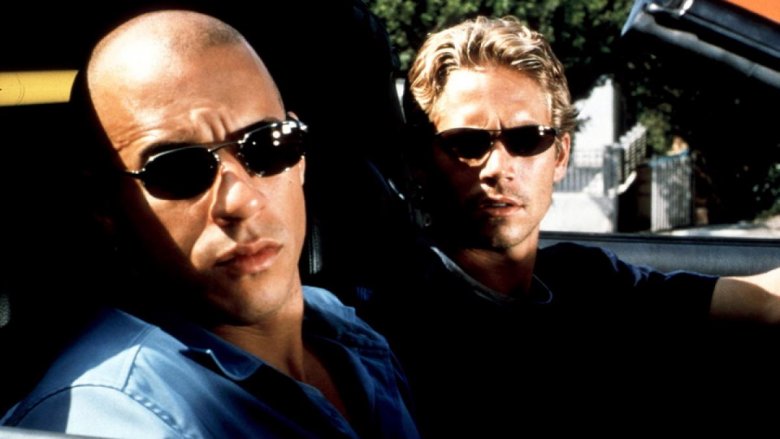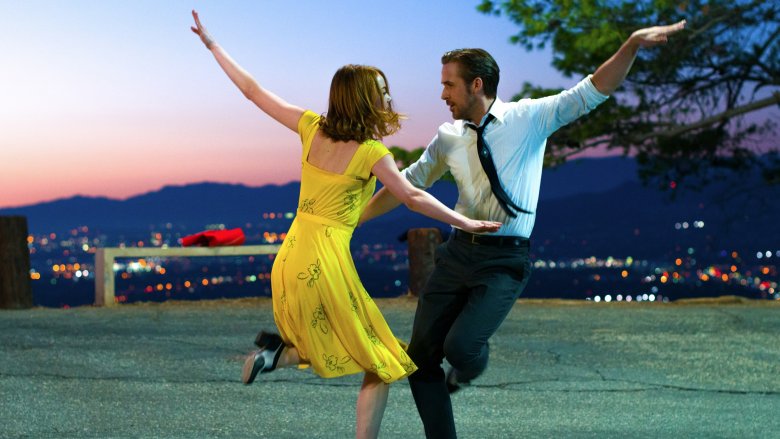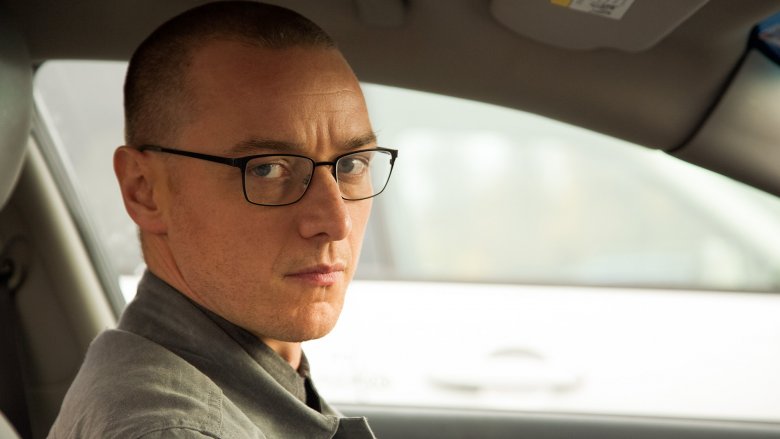Actors That Weren't The First Choice For Roles They Landed
Can you picture a world where Harrison Ford wasn't Indiana Jones? Where somebody other than Hugh Jackman was the Wolverine? Or a universe where Keanu Reeves didn't get the part of Neo? Well, if things had played out differently, these three movies could've looked radically different, as none of these guys were the original picks for their iconic roles.
What's crazy is this kind of thing happens all the time. Due to scheduling conflicts or creative disputes, actors often drop out of big projects, forcing filmmakers to go down a list of possible stars, looking for a replacement. And more often than not, picking your number two guy (or number three or number ten) leads to serious movie magic. Need proof? Then check out these ladies and gents, all talented actors who weren't the first choice for roles they landed.
Joel Kinnaman in Suicide Squad (2016)
Love it or hate it, you've got to admit that Suicide Squad features an impressive line-up of movie stars. There's Will Smith, Margot Robbie, Jared Leto... and Joel Kinnaman. Okay, granted, Kinnaman isn't exactly the biggest name in Hollywood, but the RoboCop star does a fine job playing Rick Flag, the Special Forces colonel tasked with keeping the ragtag bunch of baddies in line.
However, while Kinnaman certainly holds his own against the antics of the A-listers, he wasn't the first choice for the part of Flag. In fact, according to IndieWire, the Swedish actor was actually the last person picked for the film. That's because the role of Rick was originally meant for a guy with a DC film already in his résumé—Tom Hardy. And the man who played Bane was pretty excited to show up alongside Deadshot and Harley Quinn, only he had to drop out thanks to a little film called The Revenant.
According to Hardy, the Alejandro Inarritu film was supposed to wrap a lot earlier than it actually did. Unfortunately, due to a lack of snow, production on The Revenant was shut down for three months, throwing Hardy's schedule all out of whack. And since it was going to take additional time to finish up his mountain man movie, Hardy was forced to pull out of Suicide Squad, a decision that left him left him "gutted" and constantly complaining about how The Revenant was "losing [him] significant money on a daily basis."
Of course, Suicide Squad was absolutely savaged by critics, and Hardy went on to snag an Oscar nod for his turn as John Fitzgerald, so at the end of the day, things seemed to have worked out pretty well for the English actor.
Frances McDormand in Blood Simple (1984)
If you're a fan of the Coen brothers, then you've no doubt noticed these guys enjoy working with a certain group of actors again and again. For example, there's John Goodman, Steve Buscemi, and George Clooney, but perhaps the most prominent member of the Coen stock company is Frances McDormand. She's appeared in eight of their films—winning an Oscar for her performance as Marge Gunderson in Fargo—including their very first feature, Blood Simple.
In this 1984 neo-noir, McDormand plays Abby, a Texas woman caught in a game of life that death that involves a vengeful husband, a murderous detective, and a catchy song by The Four Tops. But believe it or not, McDormand wasn't the Coens' first choice for Blood Simple. According to Joel Coen, the brothers had been visiting theaters in New York, scouting for talent, when they saw an up-and-coming Holly Hunter starring in a Beth Henley play called Crimes of the Heart. The Coens were impressed with her performance and asked Hunter to try out for the part of Abby. However, the actor was forced to turn down the gig because she'd already agreed to do another play.
But Hunter knew someone else who might be up to the challenge: her roommate, Frances McDormand. The rest was Hollywood history, and this fortuitous casting choice also worked out pretty well romantically speaking, as McDormand married Joel Coen less than a year after signing onto the film.
Gene Wilder in Blazing Saddles (1974)
While he's best remembered for his iconic performance as Willy Wonka, Gene Wilder also collaborated with director Mel Brooks on a series of classic comedies, such as The Producers, Young Frankenstein, and most infamously, Blazing Saddles. This 1974 satire was a savage takedown of both the Western genre and race relations in America, and it featured Wilder as the Waco Kid, a drunken gunfighter who decides to help Sheriff Bart (Cleavon Little) face down racist townsfolk and an evil gang of cowboys, bikers, and Nazi soldiers. (It's a weird movie.)
But while Wilder seems like such an obvious guy to play the part, Mel Brooks originally wanted an older actor, somebody who "could look like an over-the-hill alcoholic." He considered going after Dan Dailey—an actor best known for starring in old-timey musicals—and thought about casting talk show host Johnny Carson. Brooks even asked John Wayne to read the script, and while the Duke thought it was hysterical, he said the movie was "much too rough and raw" and that he couldn't play in a movie "that had such low-down dirty talk." (However, he did promise to be "the first one in line to see it.")
Eventually, Brooks hired a guy named Gig Young (who won an Oscar for They Shoot Horses, Don't They?), but he had to drop out due to, ironically, his own problems with alcohol. Desperate, Brooks decided to cast Wilder who'd been asking for quite some time to play the part. And as the director explained, "I wanted an old alky. I got a young Jew from New York—and he was magnificent."
Ed Harris in The Truman Show (1998)
In 1998, Jim Carrey gave one of his best performances to date in The Truman Show, but he wasn't the only one bringing his A-game to Peter Weir's brilliant take on TV, celebrity, and religion. Ed Harris (West World, Apollo 13, A Beautiful Mind) also created a memorable character in Christof, the all-powerful director who sits in his moon base and controls every detail of Truman's life. But while Harris was perfect in the role, he actually didn't get the part until two months after shooting started, and that's because Christof was actually meant to be played by a Hollywood legend.
Best known for his performances in movies like Easy Rider, Apocalypse Now, Blue Velvet, and Hoosiers, Dennis Hopper was the man originally cast as Christof, but he didn't last very long. Speaking with Sabotage Times, Hopper said he "was on the set for like, two days, and got fired." The actor blamed his dismissal on producer Scott Rudin, saying Rudin had "made an agreement with the director [Peter Weir] that... if he didn't like what I did after the first day's dailies then he would fire me. And they fired me."
Hopper doesn't know why Rudin disliked him so much, and he was crushed by the turn of events, describing the incident as a "major blow." As Hopper explained, "I'd gone and really researched the part. It was really an unfortunate situation." It also put Ed Harris in a bit of a spot, as he started shooting just days after signing onto the project. "So I didn't have much time to prepare," Harris told The Morning Call, "but it worked out all right. In fact, it was almost a blessing in disguise, because I was forced to trust my instincts."
Clint Eastwood in A Fistful of Dollars (1964)
Directed by Sergio Leone, A Fistful of Dollars is the movie that kickstarted Clint Eastwood's career as the whispering, no-nonsense, squinty-eyed action hero that we've all come to know and love. But back in the early '60s, Eastwood was just a lowly TV actor and nowhere close to the top of the list when it came to casting choices.
In fact, Leone offered the role of the Man with No Name to pretty much every actor in Hollywood before giving the gig to Eastwood. He went after guys you've probably never heard of, like Rory Calhoun, Henry Silva, Eric Fleming, and Frank Wolfe. He also tried to lure in bigger names like Henry Fonda, Charles Bronson, and James Coburn, but they all shot down his proposal, mainly over money. Leone could only pay $15,000, which wasn't much for an established star. Plus, as far as Bronson was concerned, the screenplay for Fistful was "just about the worst" he'd ever seen. (Interestingly, both Bronson and Fonda would later team up with Leone for Once Upon a Time in the West.)
Fortunately, the Italian director saw an episode of the TV show Rawhide—the episode in question was "Incident of the Black Sheep"—which featured a young Eastwood as Rowdy Yates, a naïve, immature cowboy who's a whole lot friendlier than the Man with No Name. Despite the differences, Leone thought Eastwood was "good at getting on a horse," and said that he appreciated the man's "laid-back quality." Soon enough, Eastwood was one of the biggest movie stars in history, all thanks to a corny TV show and a bunch of overpaid actors.
Casey Affleck in Manchester by the Sea (2016)
Some roles seem destined for a particular actor. Honestly, can you imagine anyone other than Daniel Day-Lewis in Lincoln? Can you think of anyone who'd do a better job as the eponymous bad guy in Kill Bill than David Carradine? It's pretty much the same story with Casey Affleck in Manchester by the Sea. In this critically-acclaimed film, Affleck plays Lee Chandler, a man struggling with grief and guilt in the aftermath of a terrible tragedy, and he totally owns the part.
But hey, here's a shocker. Liam Neeson was originally offered the role of Abraham Lincoln. Warren Beatty was Quentin Tarantino's first choice for Kill Bill. And Matt Damon was initially going to star in Manchester by the Sea. According to Rolling Stone, the plot was dreamed up by Damon and John Krasinski of The Office, and they asked filmmaker Kenneth Lonergan to write the script. Damon intended to direct and star, but the best laid plans of mice and movie stars gang aft agley. It took Lonergan three years to write the first draft, and when he was done, Damon didn't have time to direct. He still wanted to play the main character, but when other projects got in the way, he gave the role of Lee to his good buddy, Affleck.
"This is one of the best roles I've ever seen for a leading actor," Damon told The Hollywood Reporter. "I didn't want to hand it off to somebody unless that was somebody I grew up with and who would make me happy I gave it up." And it was a decision that totally paid off, as Affleck would go on to win a well-deserved Oscar for his performance, beating out the likes of Viggo Mortensen, Ryan Gosling, and Denzel Washington.
Jodie Foster and Kristen Stewart in Panic Room (2002)
Sandwiched in between Fight Club and Zodiac, Panic Room is a film that's often forgotten when discussing David Fincher films. And really, that's too bad, as the 2002 film is a solid thriller featuring strong performances from its two female leads, Jodie Foster and Kristen Stewart. The two play a mom and daughter taking shelter inside, well, a panic room after a trio of thieves (Jared Leto, Forest Whitaker, Dwight Yoakam) breaks into their home. But while both actresses do a great job, neither were the original picks for this gritty suspense film.
On the DVD commentary track for Panic Room, Fincher describes the first actress chosen for the part of the daughter, Sarah, as "very feminine and girlish and all those things, and just irritated me beyond belief." Fincher doesn't mention the actress by name, but according to ABC News, Hayden Panettiere was supposed to play Sarah, but she dropped out shortly before filming started. Fincher then went with Stewart after seeing both an audition tape and a commercial featuring the young girl, saying he liked her "tomboy-ish, androgynous quality."
As for the role of Meg, the mom, the part went to Nicole Kidman, and she was actually working on the movie for about two weeks before injuring her knee. Evidently, the pain was so bad that she was forced to pull out of Panic Room. Fortunately for Fincher, Jodie Foster saved the day, taking the lead role and getting production moving again. Admittedly, casting Foster changed the director's entire vision for the film. Talking to The Guardian, Fincher explained that Kidman was all about "glamour and physicality," like Grace Kelly in a Hitchcock film, while with Foster, "it's more about what happens in her eyes. It's more political."
Vin Diesel in The Fast and the Furious (2001)
The Fast and the Furious franchise is full of memorable characters, from Han and Letty to Luke Hobbs and Brian O'Conner. And, of course, you can't forget Dominic Toretto, the street-racing criminal who puts family above all else. He's appeared in every entry in the series except one, and he's basically the rock (sorry, Dwayne Johnson) of the whole Fast and Furious universe. Similarly, it's impossible to think of anyone besides Vin Diesel playing the part of Dom. Alongside the late, great Paul Walker, Diesel is the face of the franchise.
But as you can probably guess, Diesel wasn't number one on the list of actors to try out for Toretto. Speaking on The Bill Simmons Podcast, producer Neal H. Moritz talked about making the first film, explaining that while Walker was Brian from the get-go, studio executives were keen to cast Timothy Olyphant as Dom. That's right. We're talking the man from Deadwood and Santa Clarita Diet. We're talking Deputy US Marshal Raylan Givens of Justified fame. However, for unknown reasons, Olyphant passed on the part, which Mortiz described as "the luckiest thing that ever happened to us."
True, seeing Olyphant as Dom would've been interesting, but picking Diesel was obviously the right choice. The first Fast and the Furious earned $207 million on a $38 million budget, and the series has gone to become one of the top-ten highest-grossing franchises of all-time, largely thanks to Diesel's star power. So yeah, it looks like the studio executives at Universal (eventually) chose the right man for the job.
Emma Stone and Ryan Gosling in La La Land (2016)
Sure, La La Land didn't win the Oscar for Best Picture, but it did win the hearts of audiences around the world, largely thanks to the winning duo of Emma Stone and Ryan Gosling. But if things had played out a little bit differently, an entirely different Emma would've been dancing across the silver screen. The same goes for Gosling, who got the call to play jazz pianist Sebastian when writer-director Damien Chazelle decided to change his original acting line-up.
What we're trying to say is this... in some alternate dimension, there's a version of La La Land starring Emma Watson and Miles Teller.
Back in early 2015, Damien Chazelle said the only thing he knew for sure about La La Land was that it would be a musical, and that Teller would play the male lead. (The two had previously worked together on Whiplash.) But a whole lot can happen when you're working on a movie, especially one you started writing back in 2010. Along the way, La La Land began to evolve, and Chazelle eventually decided that Teller wasn't right for the part. Unfortunately, the young actor didn't take the news very well and admits to sending the director a text that read, "What the f***, bro?"
Emma Watson handled things a lot better, and she was okay with passing on the part of Mia. After all, she was already committed to Beauty and the Beast, and as she explained to Entertainment Weekly, she just didn't have enough time to devote to both projects. "I knew I had horse training," she said, "I knew I had dancing, I knew I had three months of singing ahead of me, and I knew I had to be in London to really do that.... So scheduling conflict-wise, it just didn't work out."
Of course, Beauty and the Beast went on to break the billion dollar barrier, becoming one of the highest grossing films ever made, and Emma Stone would win an Oscar for her performance as Mia. So yeah, it looks like things worked out pretty well for both of the Emmas.
James McAvoy in Split (2017)
When M. Night Shyamalan's Split hit theaters in early 2017, audiences were terrified by James McAvoy's performance as Kevin... and Patricia... and Hedwig... and Dennis. Playing a man with 23 personalities—and a 24th on the way—McAvoy stole the show every time he morphed into a new persona. But as it turns out, Joaquin Phoenix (who'd worked with the director on Signs) was actually Shyamalan's first choice to play Kevin and each of his individual identities. However, as the director explained to Collider, "the film gods" interfered as Phoenix was tied up with another movie and had to drop out.
Making things even more complicated, Shyamalan's second choice, McAvoy, was also committed to another film. Fortunately for everyone involved with Split, the Scottish actor's schedule soon cleared up, and he was able to sign on. But stepping into the film so suddenly posed a bit of a challenge for McAvoy, since he had to play nine different characters. As he explained to Birth.Movies.Death., due to the Phoenix fiasco, he only had "about a quarter of the time" that he usually had to prepare for just one character, let alone nine. Still, McAvoy was able to pull the role(s) off perfectly, scaring audiences and critics alike.
